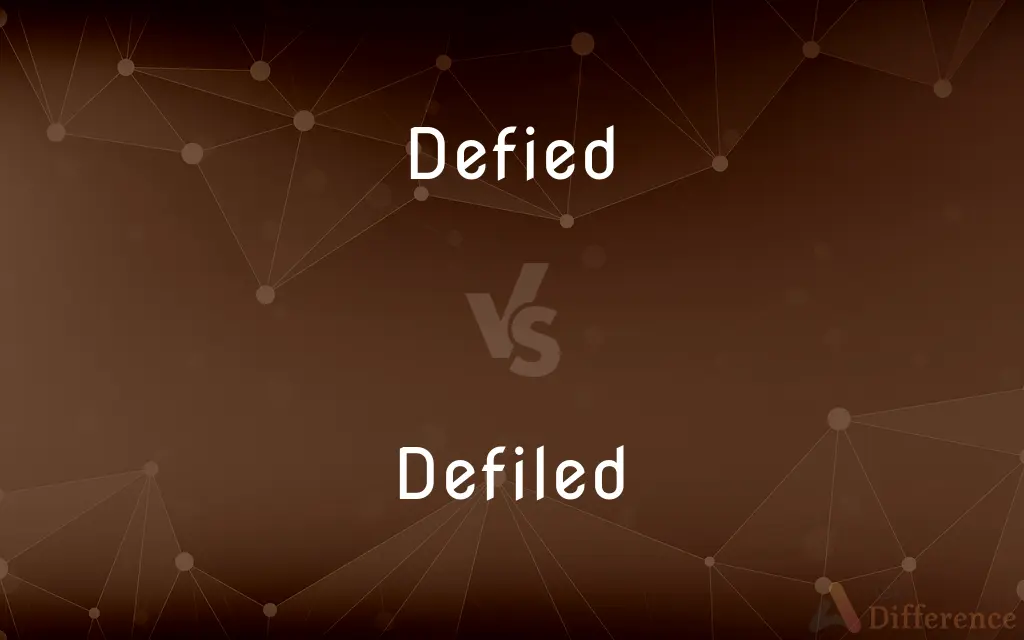Defied vs. Defiled — What's the Difference?
By Maham Liaqat & Fiza Rafique — Updated on April 2, 2024
Defied involves challenging authority or norms, whereas defiled means to corrupt or despoil something pure or sacred, focusing on confrontation vs. corruption.

Difference Between Defied and Defiled
Table of Contents
ADVERTISEMENT
Key Differences
Defied refers to the act of openly challenging or refusing to obey someone or something, such as an authority figure or a set of rules. It embodies resistance and a bold stance against compliance. On the other hand, defiled pertains to making something dirty, impure, or less respected, especially things that were once pure or held in high esteem.
The essence of defying is found in its root of opposition and confrontation, often seen as a form of protest or rebellion. This action can be driven by a belief in injustice or a desire for change. Whereas, to defile something is to tarnish its purity or sanctity, which can happen through physical contamination, moral corruption, or desecration, indicating a violation rather than mere disobedience.
While defiance can be an act of courage or principle, standing against perceived wrongs or asserting autonomy, defilement is generally seen as a negative act that reduces the value, honor, or purity of something. Defilement often implies a disrespect or degradation of what is considered sacred or valuable.
Defiance can inspire change or spark significant movements, reflecting a proactive stance against the status quo for ideological, ethical, or personal reasons. In contrast, defilement typically causes harm or degradation, leading to loss, damage, or dishonor of the object, place, or concept affected.
Both actions can provoke strong reactions from others; defiance might be met with punishment or admiration, depending on the context and perspective, while defilement often draws widespread condemnation, reflecting societal values on purity and respect.
ADVERTISEMENT
Comparison Chart
Definition
To resist or challenge openly.
To spoil or desecrate something sacred or valued.
Connotation
Often positive, suggesting courage or principled stand.
Negative, implying corruption or degradation.
Related to
Authority, norms, rules.
Purity, sanctity, respect.
Common contexts
Acts of rebellion, civil disobedience.
Pollution, violation of sacred places.
Impact
Can be empowering or lead to change.
Leads to diminishment or disrespect.
Compare with Definitions
Defied
Challenging authority.
The activist defied the government's orders peacefully.
Defiled
Polluting something pure.
The river was defiled by industrial waste.
Defied
Refusing to obey.
She defied the school's dress code by wearing a costume.
Defiled
Violating honor.
The monument's defilement sparked national outrage.
Defied
Standing up against odds.
Despite the risks, she defied the odds and succeeded.
Defiled
Corrupting morally.
The scandal defiled the organization's reputation.
Defied
Rejecting constraints.
They defied traditional genre constraints in their music.
Defiled
Desecrating sacred things.
The ancient tomb was defiled by vandals.
Defied
Resisting norms.
He defied social norms by pursuing a career in arts.
Defiled
Tarnishing reputation.
His actions defiled his family's name.
Defied
To oppose or resist with boldness and assurance
Defied the blockade by sailing straight through it.
Defiled
To make filthy or dirty; pollute
Defile a river with sewage.
Defied
To refuse to submit to or cooperate with
Defied the court order by leaving the country.
Defiled
To debase the pureness or excellence of; corrupt
A country landscape that was defiled by urban sprawl.
Defied
To be beyond the application or scope of; be contrary or resistant to
An act that defies explanation.
A problem that defies any conventional approach.
Defiled
To profane or sully (a reputation, for example).
Defied
To challenge or dare (someone) to do something
She defied her accusers to prove their charges.
Defiled
To make unclean or unfit for ceremonial use; desecrate
Defile a temple.
Defied
Simple past tense and past participle of defy
Defiled
To move in single file or in files or columns
The soldiers defiled from the fort, arms raised in surrender.
Defiled
A narrow gorge or pass that restricts lateral movement, as of troops.
Defiled
A march in a line.
Defiled
Impure; dirty
Defiled
Simple past tense and past participle of defile
Defiled
Morally blemished.
Defiled
Ritually unclean. Opposite of clean.
Defiled
Morally blemished; stained or impure
Defiled
Having the purity corrupted; made unclean;
The defiled Temple
Common Curiosities
Can defiance be positive?
Yes, defiance can be seen as positive, especially if it's in response to injustice or for a principled stand.
How do societies respond to acts of defiance and defilement?
Responses vary; defiance might be punished or praised, while defilement is typically met with condemnation.
Can an act be both defiant and defiling?
Yes, an act can be seen as defiant if it challenges authority and defiling if it corrupts something valued.
What is the difference between defying laws and breaking them?
Defying laws involves open resistance or refusal to follow, while breaking them can be done covertly.
What motivates defiance?
Defiance is often motivated by a desire for change, justice, or the expression of individuality.
How do acts of defiance impact society?
They can inspire change, challenge the status quo, or provoke discussion on important issues.
What role does intention play in defiance and defilement?
Intention is key; defiance is often deliberate and principled, while defilement can be both intentional and accidental.
What does it mean to defy someone?
To defy someone means to openly resist or refuse to obey them.
What are examples of defilement?
Examples include polluting a river, vandalizing a sacred site, or corrupting someone's reputation.
Is defilement always intentional?
While defilement can be intentional, it can also occur through careless actions that lead to desecration or corruption.
Is it possible to defile an idea?
Yes, ideas can be defiled through corruption, misrepresentation, or by associating them with negative actions.
Why is defilement considered harmful?
Defilement is harmful because it disrespects, damages, or degrades something of value or sanctity.
Do cultures view defiance differently?
Yes, cultural values and norms significantly influence how defiance is perceived and responded to.
Can environmental actions be considered defilement?
Yes, actions that harm the environment, like pollution, are considered defilement.
Can a person be defiled?
In a metaphorical sense, yes, through actions that tarnish one's honor, reputation, or moral standing.
Share Your Discovery

Previous Comparison
Castle vs. Temple
Next Comparison
Rant vs. RuntAuthor Spotlight
Written by
Maham LiaqatCo-written by
Fiza RafiqueFiza Rafique is a skilled content writer at AskDifference.com, where she meticulously refines and enhances written pieces. Drawing from her vast editorial expertise, Fiza ensures clarity, accuracy, and precision in every article. Passionate about language, she continually seeks to elevate the quality of content for readers worldwide.
















































